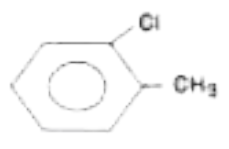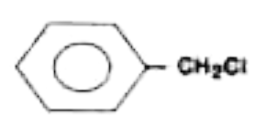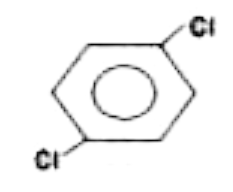Which of the following alkyl halides is hydrolysed by SN1 mechanism?
CH3Cl
CH3CH2Cl
CH3CH2CH2Cl
(CH3)3CCl
The correct Answer is:D
To determine which alkyl halide is hydrolyzed by the SN1 mechanism, we need to analyze the stability of the carbocations formed during the reaction. The SN1 mechanism involves two key steps: the formation of a carbocation and the subsequent attack of a nucleophile. The rate of the reaction is dependent on the stability of the carbocation; more stable carbocations lead to faster reactions.
1. Identify the Alkyl Halides:
The options provided are:
- CH₃Cl (Methyl chloride)
- CH₃CH₂Cl (Ethyl chloride)
- CH₃CH₂CH₂Cl (Propyl chloride)
- (CH₃)₃CCl (Isobutyl chloride)
2. Determine the Type of Carbocation Formed:
- For CH₃Cl: When it loses Cl⁻, it forms a methyl carbocation (CH₃⁺), which is a primary carbocation.
- For CH₃CH₂Cl: It forms an ethyl carbocation (CH₃CH₂⁺), which is also a primary carbocation.
- For CH₃CH₂CH₂Cl: It forms a propyl carbocation (CH₃CH₂CH₂⁺), which is again a primary carbocation.
- For (CH₃)₃CCl: It forms a tertiary carbocation ((CH₃)₃C⁺), which is more stable due to the inductive effect of the three methyl groups.
3. Evaluate Carbocation Stability:
The stability of carbocations follows this order:
- Tertiary > Secondary > Primary
- The methyl and ethyl carbocations are primary, and the propyl carbocation is also primary. However, the isobutyl carbocation is tertiary, making it the most stable.
4. Conclusion:
Since the SN1 mechanism favors the formation of more stable carbocations, the alkyl halide that will undergo hydrolysis via the SN1 mechanism is isobutyl chloride (option 4).
Final Answer:
Isobutyl chloride (option 4) is hydrolyzed by the SN1 mechanism.
---
The options provided are:
- CH₃Cl (Methyl chloride)
- CH₃CH₂Cl (Ethyl chloride)
- CH₃CH₂CH₂Cl (Propyl chloride)
- (CH₃)₃CCl (Isobutyl chloride)
- For CH₃Cl: When it loses Cl⁻, it forms a methyl carbocation (CH₃⁺), which is a primary carbocation.
- For CH₃CH₂Cl: It forms an ethyl carbocation (CH₃CH₂⁺), which is also a primary carbocation.
- For CH₃CH₂CH₂Cl: It forms a propyl carbocation (CH₃CH₂CH₂⁺), which is again a primary carbocation.
- For (CH₃)₃CCl: It forms a tertiary carbocation ((CH₃)₃C⁺), which is more stable due to the inductive effect of the three methyl groups.
The stability of carbocations follows this order:
- Tertiary > Secondary > Primary
- The methyl and ethyl carbocations are primary, and the propyl carbocation is also primary. However, the isobutyl carbocation is tertiary, making it the most stable.
Since the SN1 mechanism favors the formation of more stable carbocations, the alkyl halide that will undergo hydrolysis via the SN1 mechanism is isobutyl chloride (option 4).
Isobutyl chloride (option 4) is hydrolyzed by the SN1 mechanism.
Topper's Solved these Questions
- HALOALKANES AND HALOARENESBOOK - NCERT FINGERTPS ENGLISHCHAPTER - HALOALKANES AND HALOARENESEXERCISE - Higher order thinking skills
8 Videos
- HALOALKANES AND HALOARENESBOOK - NCERT FINGERTPS ENGLISHCHAPTER - HALOALKANES AND HALOARENESEXERCISE - Exemplar problems
24 Videos
- HALOALKANES AND HALOARENESBOOK - NCERT FINGERTPS ENGLISHCHAPTER - HALOALKANES AND HALOARENESEXERCISE - Physical properties
7 Videos
- GENERAL PRINCIPLES AND PROCESSES OF ISOLATION OF ELEMENTSBOOK - NCERT FINGERTPS ENGLISHCHAPTER - GENERAL PRINCIPLES AND PROCESSES OF ISOLATION OF ELEMENTSEXERCISE - Assertion And Reason
15 Videos
- POLYMERS BOOK - NCERT FINGERTPS ENGLISHCHAPTER - POLYMERS EXERCISE - NCERT Exemplar
9 Videos
Similar Questions
Knowledge Check
Which of the following is an aryl alkyl halide.
A B
B C
C DNone of these
DNone of these
Which of the following halides cannot be hydrolysed?
View SolutionWhich of the following alkyl halides undergoes the fastest SN1 reaction ?
View SolutionWhich of the following alkyl halides is iso -butyl bromide ?
View SolutionWhich of the following compound is most rapidly hydrolysed by SN1 mechanism?
View SolutionWhich of the following halide undergoes in hydrolysis via SN1 reaction?
View SolutionWhich of the following alkyl halides on hydrolysis gives a glycol?
View SolutionWhich of the following halides of group 15 is not hydrolysed ?
View Solution
